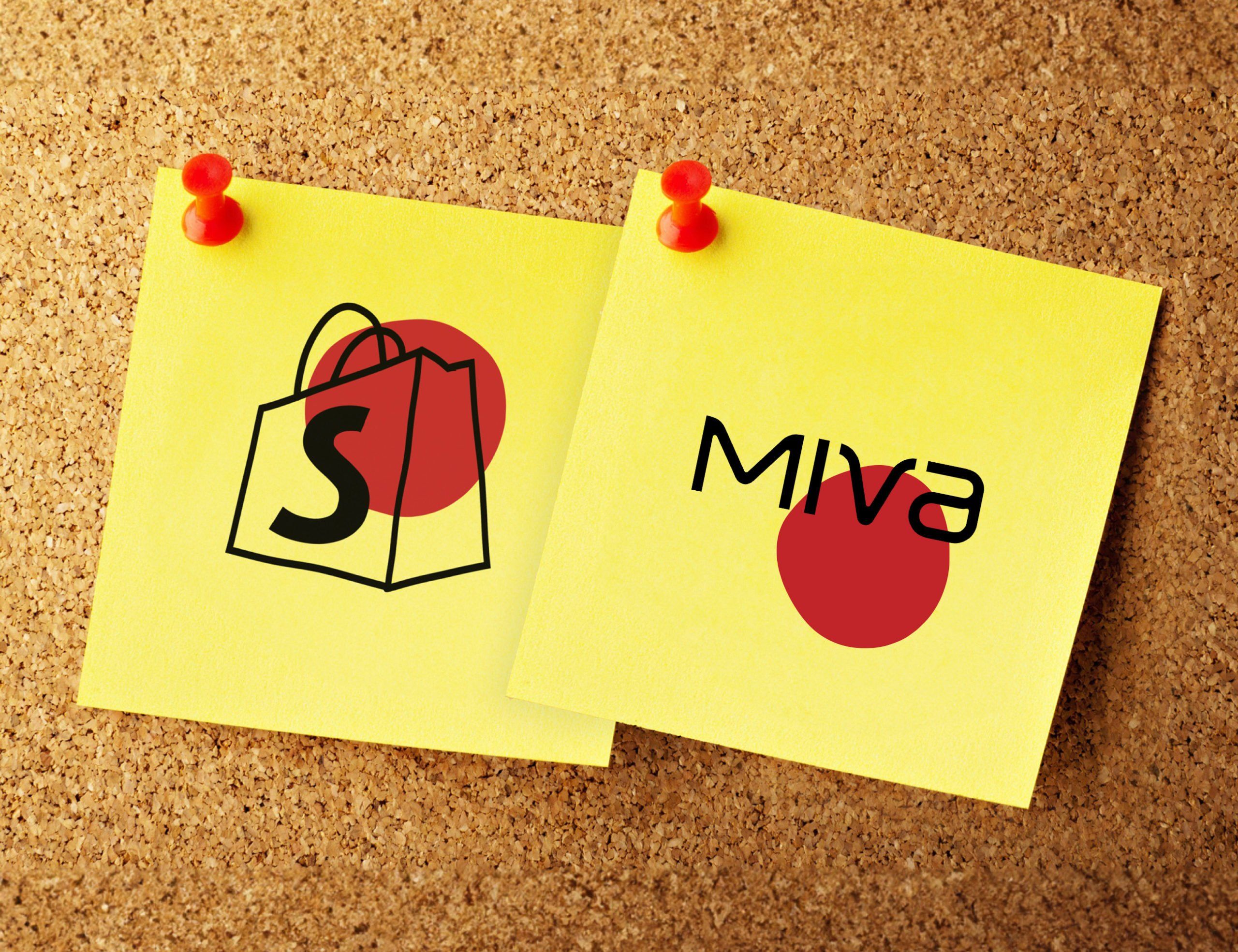
In the ever-evolving landscape of eCommerce, staying ahead of the curve is essential for merchants aiming to thrive in the digital marketplace. While platforms like Miva have long been stalwarts in the industry, the rise of Shopify is ushering in a new level of eCommerce Software as a Service (SaaS). Make no mistake, Miva remains a formidable choice for online businesses; however, Shopify offers merchants access to a vastly more robust ecosystem. Our direct comparison of Miva vs. Shopify revealed Shopify to be the clear winner. This ecosystem is a veritable toolkit, empowering Shopify merchants with tools and resources to gain a competitive edge over their counterparts still tethered to Miva.
With decades of experience handling eCommerce migrations, InteractOne is a trusted Shopify agency with the knowledge and expertise to carefully weigh the pros and cons of both platforms.
- What is Miva?
- Strengths and Weaknesses of Miva
- What is Shopify?
- Strengths and Weaknesses of Shopify
- Which Platform Wins?
- FAQ
Miva Merchant: A Godfather of SaaS for eCommerce
What is Miva?
Miva Merchant is an eCommerce platform that has established itself as a reliable option for online businesses. It offers a simple point-and-click system for building and managing online stores, making it easy for merchants to set up shop. It also offers developers opportunities for aftermarket enhancements. Initially designed for businesses with complex product catalogs or specific needs, Miva has grown into a flexible solution. It gives merchants control over the selling process, allowing for fast and adaptable operations. The platform caters to a broad spectrum of businesses, from growing mid-size enterprises to large corporations. Miva supports various sales models, including B2B (business-to-business), B2C (business-to-consumer), and DTC (direct-to-consumer), making it adaptable across diverse industries and market segments.Strengths of Miva
Miva Merchant boasts a wide array of features tailored for online businesses, ensuring a robust platform for success:- Point-and-Click Development: Miva Merchant’s user-friendly interface enables easy store customization directly within a web browser.
- Versatile Sales Support: Miva accommodates B2B, B2C, and DTC sales on a single website, making it ideal for businesses with diverse needs.
- Order Processing: The platform efficiently manages and fulfills customer orders.
- Responsive Design: The latest release is optimized for usability and touch interfaces, featuring enhanced navigation tools.
- Customization and Development: Miva provides developers with tools to tailor the platform to specific business needs and enhance online stores.
Weaknesses of Miva
Smaller Ecosystem
Unlike Shopify or BigCommerce, Miva has a more limited selection of third-party apps and integrations. This can result in higher costs for merchants who need to invest in custom apps instead of using readily available solutions. For example, while Shopify offers a vast app store with features like “buy online, pick up in-store,” Miva lacks similar options, necessitating costly custom development.Cost
Since Miva lacks the ecosystem of larger platforms like Shopify, development costs for Miva customers can be significantly higher. As a result, when Miva merchants require specific functionalities not already supported by existing apps (such as “Buy Online Pickup In-store”), they have to bear the burden of higher development expenses to develop and maintain the custom apps.Steep Learning Curve
While Miva provides a point-and-click interface for store development and management, some users may find it challenging to administer, especially those with specialized industry requirements or complex product catalogs. The platform’s scripting language and customization options may demand non-technical users to invest time in learning and understanding, potentially resulting in a steep learning curve.Shopify – The 800lb Gorilla
Strengths of Shopify
The Ecosystem – Great User Experience
Shopify boasts a vast ecosystem of apps that seamlessly integrate with the platform. This abundance of options allows merchants to quickly enhance their stores’ user experience at a low cost.Easy to Use
People rave about Shopify’s intuitive interface and built-in features, making it straightforward for merchants to set up and manage their online stores. With user-friendly design elements and helpful tips, Shopify enhances the overall user experience. It features responsive design, optimized navigation, and search functionality for a smooth shopping journey.Cost-Effective
The prevalence of third-party apps that enhance the store without requiring further modifications translates to a lower cost for merchants. This contrasts with platforms like Miva, where there are much fewer pre-existing app options, thus forcing Miva customers to build more custom apps.
Ready to make the move?
Following a comprehensive comparison of Miva vs. Shopify, it’s evident that Shopify reigns supreme. After marketing, crafting a superb user experience is a paramount factor for online merchants. With its intuitive ecosystem of third-party integrations and apps, Shopify offers merchants a significant advantage in this regard. While transitioning from Miva to Shopify may seem daunting, the benefits are clear: Shopify offers merchants a substantial advantage in creating exceptional user experiences and lowering custom app costs. Navigating this migration journey requires expertise and experience, which is where InteractOne excels. As a trusted Shopify agency with a proven track record in migrating Miva merchants to Shopify, InteractOne is your dependable partner in migrating eCommerce platforms. Contact us today for a free proposal, and let us guide you toward a seamless and successful transition.FAQ
Q: Can I transfer my current online shop to Shopify or Miva without losing data?
Shopify and Miva Merchant both facilitate the migration of data from other platforms. This means you can smoothly transfer your products, customer details, and orders without interrupting your ongoing operations. Keep in mind that you cannot migrate customer password data.Q: Do I need technical skills to manage Shopify or Miva?
Shopify is renowned for its intuitive interface, which ensures accessibility even for users with limited technical knowledge. Fully utilizing Miva Merchant’s extensive customization capabilities may require a more thorough grasp of technical concepts. Both platforms, however, require custom development for complex theme customizations or development of custom apps and integrations.Q: Does Shopify or Miva have better customer support?
Shopify is widely known for its strong customer support system, which includes various channels and round-the-clock assistance. Conversely, while Miva Merchant’s support information may be less prominently displayed, they typically offer dedicated support to their users.Q: How does my choice of eCommerce platform impact my store’s SEO performance?
Both Shopify and Miva Merchant offer SEO tools to boost your online visibility. When transitioning from Miva to Shopify, SEO considerations are crucial. To minimize negative impacts on search rankings, preserve SEO elements such as page URLs and meta tags. Shopify offers SEO features like customizable title tags, meta descriptions, and mobile optimization, all of which can boost search performance. Careful migration planning and effective use of Shopify’s SEO tools are vital for maintaining and enhancing search visibility during the transition.Q: Does Shopify or Miva have better security to keep my customers’ data secure?
Both platforms highly value security measures, following industry-standard practices such as SSL encryption to protect customer data and ensure confidentiality.Drop Us a Line At:
Or, if you prefer an old-fashioned phone call:
Phone (USA): (513) 469-3362
250 East Fifth Street 15th Floor PMB 664
Cincinnati, OH 45202

